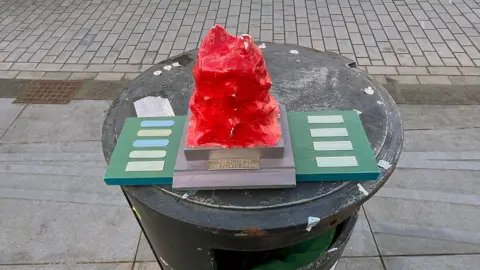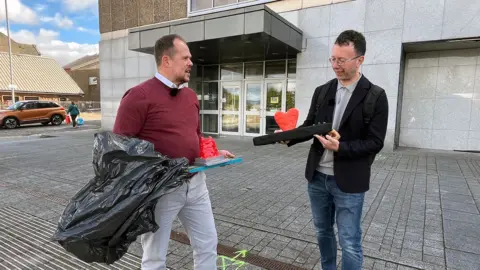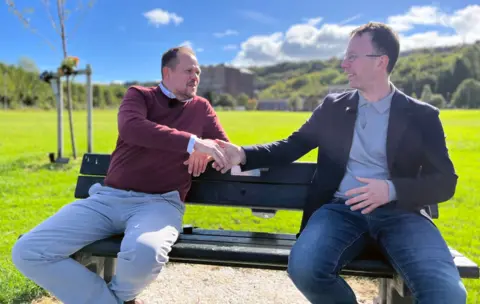 Getty Images
Getty ImagesThe long-running “Plook on the Plinth” Carbuncle Award for “the most dismal town in Scotland” has been scrapped following a backlash from its latest recipient.
Two weeks ago social entrepreneur Kevin Green refused to accept the trophy on behalf of Port Glasgow, denouncing it as “poverty tourism” which failed to reflect the Inverclyde town’s “punching up, not punching down” spirit.
The magazine behind the award has now agreed to replace it with a more positive alternative which recognises untapped potential and community spirit.
The Plook on the Plinth trophy has been officially retired and replaced by the new “Heart On Your Sleeve” Award, with Port Glasgow named as its first winner.
The Carbuncle Awards, run by architecture magazine Urban Realm, were inspired by a scathing comment about modern building design made by King Charles back in the 1980s.
The then Prince of Wales described a proposed extension of London’s National Gallery as a “monstrous carbuncle on the face of a much-loved and elegant friend”.
The ensuing debate eventually saw the launch of an annual Carbuncle Award for the most dismal town in Scotland and a trophy featuring a plook – a Scottish word for pimple – fashioned out of Play-Doh.

Urban Realm’s current editor John Glenday says the award was intended as a “shock and awe” approach which would help galvanise communities that need help.
“Scotland is very centralised economically and politically. Smaller towns can fall down the back of the couch,” he explained.
“The Carbuncle Awards are a way of bringing these places to attention and the problems that they face.”
Port Glasgow rejects the Carbuncle
The Plook was previously presented on seven occasions to six different towns, beginning with Airdrie in 2000.
Cumbernauld was most frequently nominated and received the award twice.
After Aberdeen was named “winner” in 2015, the magazine decided on a pause which lasted until this year when Port Glasgow was chosen as the eighth recipient.
But the presentation event took an unexpected twist when Kevin Green, who runs the PG25 regeneration project, refused to accept the Plook trophy.
Denouncing John’s visit as a “poverty safari”, he took issue with the magazine’s description of the town as an example of “squandered potential”.
“It’s not the most positive thing when someone comes and says you’re the most dismal town in Scotland,” said Kevin.
“I think where we can agree is on the word ‘potential’. I disagree with the word ‘squandered’. For me potential is just potential.”
John says he felt he was “run out of town”, albeit in a good-natured way, after he tried in vain to present the award – but they continued to talk and he soon warmed to Kevin’s suggestion of a more positive alternative.
It seemed fitting that the sun was shining in Port Glasgow when the pair were reunited a fortnight later and John was happy to announce that the Plook trophy had been officially retired.

The Plook’s replacement is an “equally tacky” trophy fashioned by Kevin – an arm with a red heart jutting out of it just above the elbow.
“We’re not deaf to criticism,” said John. We do appreciate that it’s a very different world that we inhabit now from a decade ago.
“This is a post-Covid economy now where we do need to pull together.
“What struck us here is the community aspect. It’s a working class community and people are very close-knit and passionate about the town and improving things.
“I think with this new award we can channel that passion into a force for good”.
John Wood Street, where Kevin’s PG25 project is based, is unique in Scotland in that almost all the shops are “Common Good” properties – buildings that were gifted to the Port Glasgow burgh many years ago by the shipbuilder Lithgows for the good of the local community.
The shops bring in about £120,000 a year for a Common Good fund, administered by Inverclyde Council and mostly used to finance Christmas decorations or the annual Gourock Highland Games.
But with more than a third of the 19 retail properties currently vacant, £50,000 is spent on bills arising from empty shops and unused flats above them.
Kevin believes if the street had full occupancy it would be bringing in about £250,000 a year which could then be reinvested in the area.
Part of the problem is that a retail park just 250m away sucks away footfall and there is little incentive for shoppers to venture into the old quarter of Port Glasgow.
A longstanding plan, led by the council, is to reconnect the old town with the retail park, and give people a reason to venture into streets that were once the beating heart of the community.
“We just need to join the dots, to turn it into a destination street that brings footfall back to the historic core,” says Kevin.
He also believes 100 square miles of regional park sitting right behind the town and a river “that we don’t make the most of” are assets waiting to be exploited.
That ambition is backed up by a survey of 700 residents. “Everyone agrees that’s what we need to do.”
One of the main obstacles to achieving that goal is a lack of money – but Kevin believes there are ways to overcome that.

Kevin’s day job is in “corporate disposals”. Big companies pay him to get rid of stuff they no longer need, ranging from office furniture to equipment like cookers.
His job brings him into contact with big firms who are looking for ways to fulfil “social value” obligations which are often a part of publicly-funded contracts.
In England and Wales a new procurement law mandates companies to spend 10% of the value of major public contracts on “above and beyond” things like training or community projects.
“We have legislation today that encourages businesses to give back to the community – and they’re desperate to do it,” he says.
“I’ve done it for the last two decades on behalf of my corporate clients. The hardest part is that communities don’t know what they want.
“What we’re trying to do here is show that if you can get your act together and show what you want, you can find those resources.”
While procurement law in Scotland is less rigorous in its social value demands, Kevin believes there is still scope to do things better.
Many big firms allow their staff to spend two days a year volunteering. He wants communities to have a clearer voice about what they need.
“Some of these firms have skilled plumbers and electricians going out and spending those days litter picking.”

Back in the PG25 community hub in John Wood Street, volunteer Abie Williams is enjoying a free coffee after a morning “scraping out shop doorways”.
On other days, he’s in the hub offering advice to people who drop in for help sorting out a problem.
He has lived in Port Glasgow for 70 years but is far less scathing about the Plook on the Plinth than Kevin.
“I think it’s been a good thing because it’s got tongues wagging,” he says.
“I remember when Cumbernauld got it, and look at the improvement in Cumbernauld.”
Abie remembers when the old town was far busier, and agrees the retail park has harmed the older shopping areas .
He also thinks people like Kevin and others in “the Port” who are trying to turn things around are often frustrated by “red tape” and “deserve more support”.
“This is an amazing town,” he said. “This town has fantastic potential – and sometimes an award like this is a good thing because it makes people aware.”
Despite Kevin’s offer to “recycle” the old Plook On The Plinth trophy, it has now been passed back into the care of Urban Realm magazine for its retirement.




